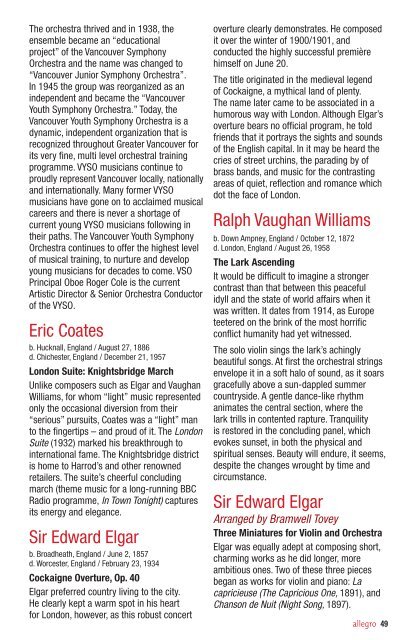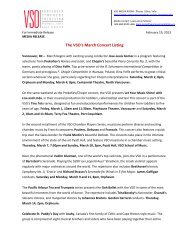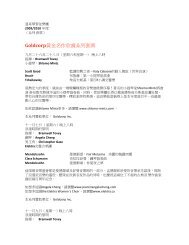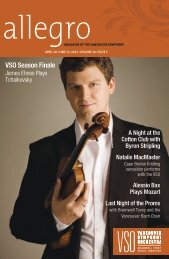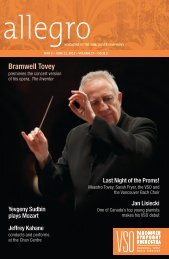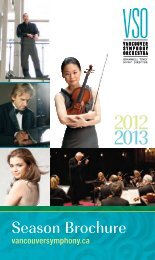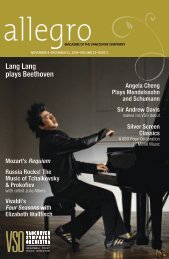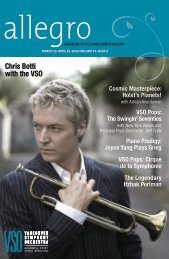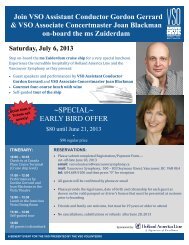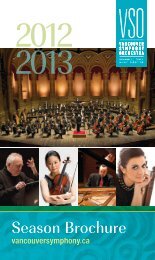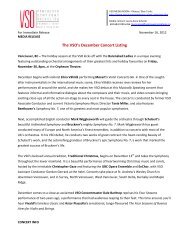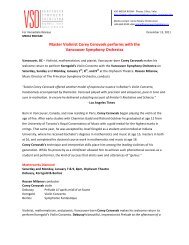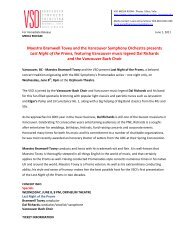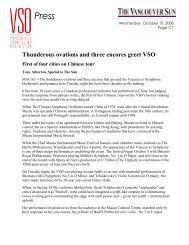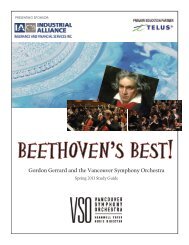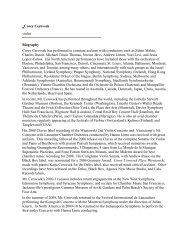issue one - Vancouver Symphony Orchestra
issue one - Vancouver Symphony Orchestra
issue one - Vancouver Symphony Orchestra
Create successful ePaper yourself
Turn your PDF publications into a flip-book with our unique Google optimized e-Paper software.
The orchestra thrived and in 1938, the<br />
ensemble became an “educational<br />
project” of the <strong>Vancouver</strong> <strong>Symphony</strong><br />
<strong>Orchestra</strong> and the name was changed to<br />
“<strong>Vancouver</strong> Junior <strong>Symphony</strong> <strong>Orchestra</strong>”.<br />
In 1945 the group was reorganized as an<br />
independent and became the “<strong>Vancouver</strong><br />
Youth <strong>Symphony</strong> <strong>Orchestra</strong>.” Today, the<br />
<strong>Vancouver</strong> Youth <strong>Symphony</strong> <strong>Orchestra</strong> is a<br />
dynamic, independent organization that is<br />
recognized throughout Greater <strong>Vancouver</strong> for<br />
its very fine, multi level orchestral training<br />
programme. VYSO musicians continue to<br />
proudly represent <strong>Vancouver</strong> locally, nationally<br />
and internationally. Many former VYSO<br />
musicians have g<strong>one</strong> on to acclaimed musical<br />
careers and there is never a shortage of<br />
current young VYSO musicians following in<br />
their paths. The <strong>Vancouver</strong> Youth <strong>Symphony</strong><br />
<strong>Orchestra</strong> continues to offer the highest level<br />
of musical training, to nurture and develop<br />
young musicians for decades to come. VSO<br />
Principal Oboe Roger Cole is the current<br />
Artistic Director & Senior <strong>Orchestra</strong> Conductor<br />
of the VYSO.<br />
Eric Coates<br />
b. Hucknall, England / August 27, 1886<br />
d. Chichester, England / December 21, 1957<br />
London Suite: Knightsbridge March<br />
Unlike composers such as Elgar and Vaughan<br />
Williams, for whom “light” music represented<br />
only the occasional diversion from their<br />
“serious” pursuits, Coates was a “light” man<br />
to the fingertips – and proud of it. The London<br />
Suite (1932) marked his breakthrough to<br />
international fame. The Knightsbridge district<br />
is home to Harrod’s and other renowned<br />
retailers. The suite’s cheerful concluding<br />
march (theme music for a long-running BBC<br />
Radio programme, In Town Tonight) captures<br />
its energy and elegance.<br />
Sir Edward Elgar<br />
b. Broadheath, England / June 2, 1857<br />
d. Worcester, England / February 23, 1934<br />
Cockaigne Overture, Op. 40<br />
Elgar preferred country living to the city.<br />
He clearly kept a warm spot in his heart<br />
for London, however, as this robust concert<br />
overture clearly demonstrates. He composed<br />
it over the winter of 1900/1901, and<br />
conducted the highly successful première<br />
himself on June 20.<br />
The title originated in the medieval legend<br />
of Cockaigne, a mythical land of plenty.<br />
The name later came to be associated in a<br />
humorous way with London. Although Elgar’s<br />
overture bears no official program, he told<br />
friends that it portrays the sights and sounds<br />
of the English capital. In it may be heard the<br />
cries of street urchins, the parading by of<br />
brass bands, and music for the contrasting<br />
areas of quiet, reflection and romance which<br />
dot the face of London.<br />
Ralph Vaughan Williams<br />
b. Down Ampney, England / October 12, 1872<br />
d. London, England / August 26, 1958<br />
The Lark Ascending<br />
It would be difficult to imagine a stronger<br />
contrast than that between this peaceful<br />
idyll and the state of world affairs when it<br />
was written. It dates from 1914, as Europe<br />
teetered on the brink of the most horrific<br />
conflict humanity had yet witnessed.<br />
The solo violin sings the lark’s achingly<br />
beautiful songs. At first the orchestral strings<br />
envelope it in a soft halo of sound, as it soars<br />
gracefully above a sun-dappled summer<br />
countryside. A gentle dance-like rhythm<br />
animates the central section, where the<br />
lark trills in contented rapture. Tranquility<br />
is restored in the concluding panel, which<br />
evokes sunset, in both the physical and<br />
spiritual senses. Beauty will endure, it seems,<br />
despite the changes wrought by time and<br />
circumstance.<br />
Sir Edward Elgar<br />
Arranged by Bramwell Tovey<br />
Three Miniatures for Violin and <strong>Orchestra</strong><br />
Elgar was equally adept at composing short,<br />
charming works as he did longer, more<br />
ambitious <strong>one</strong>s. Two of these three pieces<br />
began as works for violin and piano: La<br />
capricieuse (The Capricious One, 1891), and<br />
Chanson de Nuit (Night Song, 1897).<br />
allegro 49


